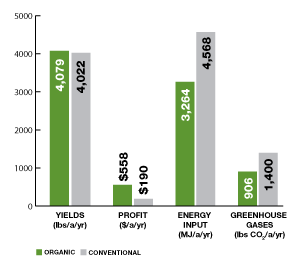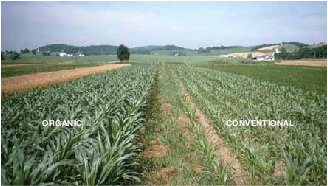
Can organic farming feed the world?
 One of the rallying points of
conventional agriculture is that organic farming can't feed the
world. They argue that we have to use chemicals and genetically
modified crops if we want to feed folks who can't afford expensive
organic produce.
One of the rallying points of
conventional agriculture is that organic farming can't feed the
world. They argue that we have to use chemicals and genetically
modified crops if we want to feed folks who can't afford expensive
organic produce.
The Rodale Institute
begs to differ, and they carried out thirty years of side by side
trials of conventional versus organic corn and soybean crops to prove
their point. According to Rodale's recent report, yields were similar for
both organic and conventional crops, but organic crops had the benefits
shown in the graph --- more profit for the farmer combined with less
energy input and lower greenhouse gas emissions.

The result I found most
intriguing is the Rodale Institute's claim that corn yields were higher
in the organic field during drought years than in the conventional
field, even though the farmers had planted GMO "drought tolerant" seeds
for the latter.
Rodale's website
mentioned that they had also run tests on the difference between
organic crops fed by manure and organic crops fed by legumes, as well
as comparing both organic and conventional no-till techniques to tilled
soil. I was intrigued to see the results of these trials, so I
dug deeper, looking for numbers. And was surprised to find no
data except for a few pretty graphs on the whole website.
The lack of data felt a
bit fishy to me, even though Rodale listed 46 peer-reviewed articles
about their trials. The Rodale Institute is one of the oldest
supporters of organic farming, and I have to wonder if they chose not
to go public with their data because there were some bad results they
didn't want to share with the public. Are there negative aspects
of their organic trials that they simply chose to sweep under the
rug? I hope not, but a more fact-filled website would go a long
way toward setting my mind at ease.
Want more in-depth information? Browse through our books.
Or explore more posts by date or by subject.
About us: Anna Hess and Mark Hamilton spent over a decade living self-sufficiently in the mountains of Virginia before moving north to start over from scratch in the foothills of Ohio. They've experimented with permaculture, no-till gardening, trailersteading, home-based microbusinesses and much more, writing about their adventures in both blogs and books.
Want to be notified when new comments are posted on this page? Click on the RSS button after you add a comment to subscribe to the comment feed, or simply check the box beside "email replies to me" while writing your comment.

Bits and pieces of their study are published in peer reviewed journals, but with a study of that magnitude, I'd expect to see a lot more data on their site. Things like graphs with standard deviation bars, p values, etc.
Even though we agree with what Rodale's saying, in a way, taking their word for it is like taking the word of Monsanto that their studies show no problems from GMO crops. Perhaps it's not a fox guarding the hen house, but it's like me guarding the chocolate jar.... A definite conflict of interest.
I probably should email them and see if I can't get more data.
I really like seeing this type of information come out. But like you, it is unsettling to not see the actual raw data. I'm VERY suspicious of any corporation anyway. Not sharing the data doesn't sit well with me.
In my mind, there are 3 reasons for not sharing the raw data.
I hope it is #2, but knowing the practices of corporations like Monsanto, ...
Of course I've been told that I'm paranoid. But just because you are paranoid, doesn't mean they aren't out to get you.
Of course without details about the methodology of their study, and the actual measurement results it is impossible for anyone to impartially evaluate their study. So I wonder if any of their research been published in peer-reviewed journals? Surely there have been more studies done into organic vs conventional farming?
The photos struck me as odd as well. The results look too good. At least in my experience it is pretty hard to get such unequivocal results from experiments. E.g. the photo of the conventional bed next to the organic bed that you also show in the post. Wouldn't nutrients and other stuff leak from one bed into the other? There doesn't seem to be a separation between them.
The booklet is remarkably low on facts, especially given their claims. Given the hugely increased profits and similar yield, I would think that farmers would be jumping to try it!
In their place I would make sure to offer ample evidence that this is not a case of confirmation bias!
Fritz --- I know what you mean. I feel a bit paranoid distrusting their pretty graphs, but that's the whole point of sharing data --- so we can all analyze it and decide whether we agree with their analysis. I did go ahead and send them an email, so hopefully they'll give me more information, which I'll report here.
Jessie --- I agree with you, but I'd go a step further and say that we should all be growing our own food. Integrated homesteads which mix row crops with livestock and orchards are more sustainable and produce more food than monocultures, whether they're chemically or organically fed. So, in a way, I consider it a moot point whether large scale organic farming can feed the world, but it is interesting to read about.
Stephanie --- Good points about lower organic prices if the processes become more mainstream --- I think Rodale put the profit part in there as a way to entice mainstream farmers who are afraid to make the shift. I also tend to agree with you about the hassle of being certified organic. Personally, I consider certified organic food in the grocery store to only have a 10% chance of being much better than the conventional food beside it. Instead, what's important to me is actually knowing the farmer and seeing how they raise their livestock (since meat is one of our remaining large food purchases.) The organic label has been watered down so much by the certification process, which means that only certain farmers are large enough to bother jumping through the hoops, and by my definition are too large to produce truly great food. But that's another kettle of fish...
Roland --- Bits and pieces of it have been published in peer reviewed journals, but who knows how they cherry-picked those bits and pieces? They do mention one other study that parallels their results, but I have to admit I didn't dig into the scientific literature to see what else is out there.
I have to agree with you on the photo being too good to be true. There are so many factors of farming to be considered, and it would be so easy to plan your trial in such a way that factors other than simply the seeds chosen and the fertilizers and pesticides used differed. After all, you could argue that mulching is an organic farming method and not a conventional farming method, which would make your organic fields do a lot better in droughts without really testing the organic vs. conventional hypothesis. (That's not what I'm seeing in the photo, but there are lots of other possible differences that I simply can't guess at since they didn't list their methods.)
And I agree about leaching between fields so close together. I don't actually think you could certify that one strip as organic in the U.S. if it has conventional crops grown that close, but it's been a few years since I looked into the certification process, so I could be wrong.
To be honest, I think that Rodale merely published the website they did because they hired some marketing people who told them that Americans are too dumb to understand real data. Those marketing people might be right, but if that's the case, I would expect Rodale to have a sister document that gives more information for folks who can understand it.